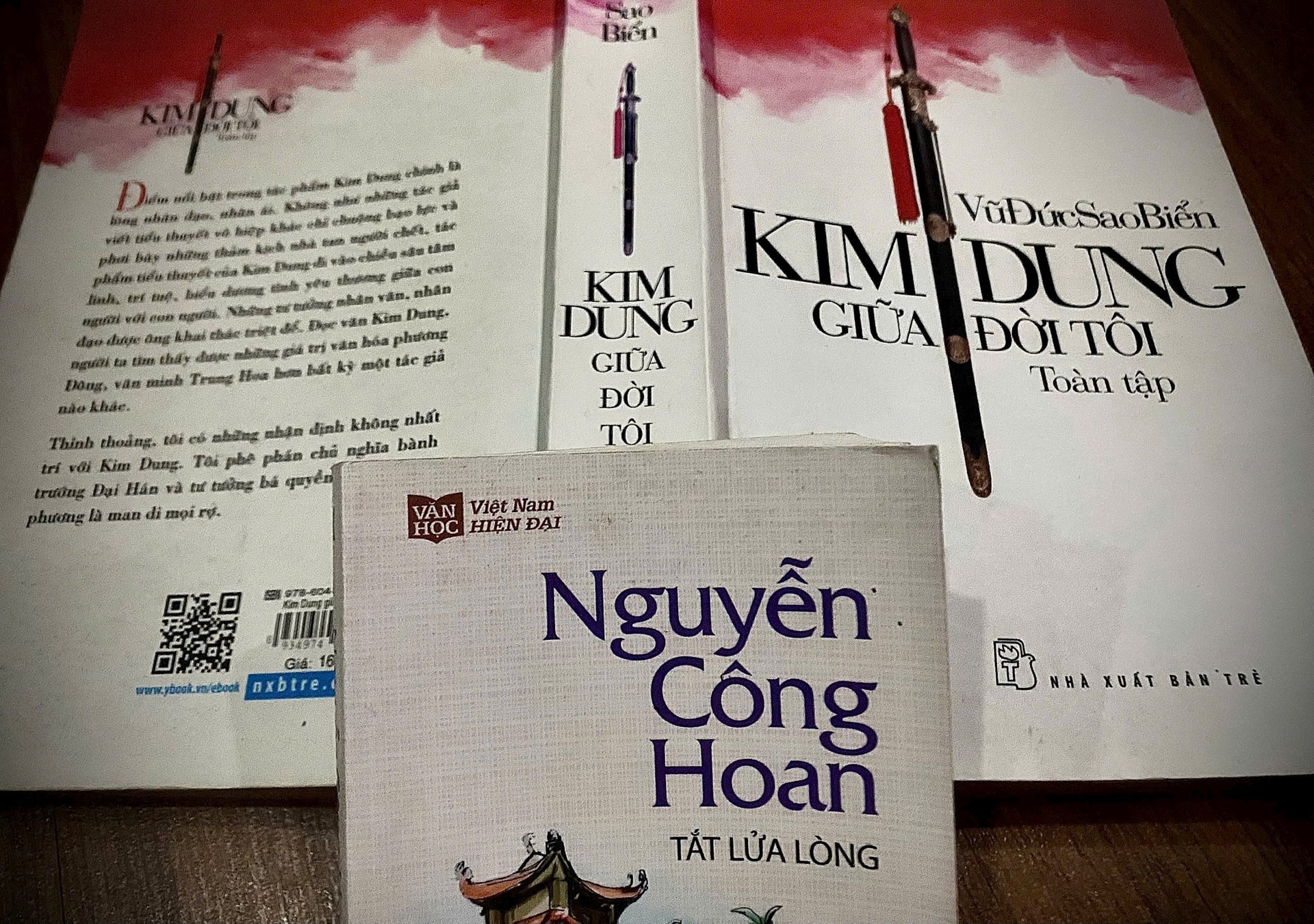
"Printing haphazardly"
"Don't try to be smarter than a flea! I'm all too familiar with those daily newspapers; they rush to print and finish any news that might get published quickly, resulting in a mess of misspelled words!" Mr. Tú once scolded his daughter, Nguyễn Thị Lan, in the novel "Extinguishing the Flame of the Heart" by writer Nguyễn Công Hoan. At that time, father and daughter were discussing Vũ Khắc Điệp's results on his Diploma exam, or secondary school diploma, after four years of studying French-Vietnamese elementary school.
The story at that point was about Mr. Tú waiting for Điệp to come and tell him about the exam results. Điệp's father and Mr. Tú were friends. Seeing that Điệp and Lan had been playing together since childhood, the two fathers promised to marry their children to each other in the future… That afternoon, the postman brought the newspaper to Mr. Tú's house before Điệp arrived.
The story continues, quoting Mr. Tú:
- Diep scored very high. He came in eighth.
Lan remained as indifferent as before, replying:
- That's the newspaper's alphabetical order, A, B, C. If the first letter of the name is D, they put it at the top, it's not about ranking or anything! (...)
- But, son, they made a printing error here; the letter 'p' was misspelled as 'n,' so the name becomes Vu Khac Dien.
Noticing something strange, Lan ran behind her father, looked at the newspaper, and said:
- Sir, that's Vu Khac Dien.
Don't try to be smarter than a flea!
(Extinguishing the Flame of the Heart, Literature Publishing House 2017, page 21).
Of course, after the angry remark, "Don't you dare try to be smarter than a flea!", Mr. Tu went on to say a long string of other things, as quoted above.
Luckily, the newspaper that day printed it correctly, with 'n' not 'p', meaning Dien passed the exam, not Diep. And of course, unfortunately, because of failing the exam, Diep's life took a different turn.
Diep went to stay at the house of Mr. Phu Tran, an old school friend of Diep's father, to study for his second exam and was promised help in finding a job. But one drunken night, Diep was tricked into sleeping in the same room with Thuy Lieu, Mr. Phu Tran's daughter (who was pregnant with a soldier from the French colonial army stationed near their house).
When Diep was forced to marry Thuy Lieu, Lan cut her hair and became a nun. The love story between Lan and Diep reached a dead end, becoming even more tragic through the melancholy of traditional Vietnamese folk songs.
Storms erupt and green shoots emerge.
Proofreading errors are a perennial problem in journalism. Ignoring the question of "rushing through the printing process" as in the Lan and Diep era, newsrooms always pay close attention to correcting technical errors. Proofreading is handled by vigilant editors. With online channels, technical errors are even more common, hence the need for additional post-publication review teams.
Professor Nguyen Duc Dan lists many examples of grammatical errors in his book "From Wrong Sentences to Good Sentences" (Youth Publishing House, 2013).
There were many humorous mistakes. One issue of a newspaper dated September 20, 1993, stated that Father Alexandre de Rhodes (Father Alexandre de Rhodes) had "joined the Party in 1620." The correct spelling should have been "joined Dang Trong in 1620." Another newspaper mistakenly misspelled a foreign word, "l'amiral" (admiral), as "l'animal," resulting in disciplinary action against the person who corrected the article.
The poet Khương Hữu Dụng went to the printing house to instruct the typesetter not to mistakenly place the word "nỗi" (with a tilde) as "nổi" (with a question mark) in the last line of his poem "Lên Côn Sơn" (or "Côn Sơn"): "And I see around me the storm." Yet, when it was reprinted, the word "nỗi bão dông" (noun) was still mistakenly placed as "nổi bão dông" (verb)...
Coincidentally, the poet Khương Hữu Dụng himself once made a typo when he was an editor at the Literature Publishing House. Around the early 1960s, Xuân Quỳnh sent a manuscript of poems titled "Trời biếc" (Blue Sky) to the Literature Publishing House, but the poet mistakenly wrote it as "Chời biếc" (Blue Sky) instead of "tr/ch". The two editors at the publishing house at the time, Khương Hữu Dụng and Yến Lan (both from the South), misread "chời" as "chồi", resulting in the poetry collection "Chồi biếc" (Blue Buds). This interesting mix-up led Professor Nguyễn Đức Dân to categorize this "ch/tr, ời/ồi anecdote" under the subheading: transforming less interesting sentences into excellent ones.
"Force" on a stack of paper and chatbot risks
In the history of printing and journalism, there are situations where, no matter how meticulous the work, accuracy cannot be guaranteed, such as the case of translating Jin Yong's martial arts novels.
The late musician and journalist Vu Duc Sao Bien, in his essay "Kim Dung in My Life," recounted a story about translation and printing in the era of translator Han Giang Nhan. He said that every morning, translator Han Giang Nhan would sit upstairs and open the Hong Kong newspapers that published Kim Dung's martial arts novels in the feuilleton style. He would read through them once, then read the Chinese sentence and immediately translate it into Vietnamese. His secretary would take care of the note-taking.
Once the translations were complete, the secretary brought them down to the ground floor and distributed them to the representatives of the newspapers who were waiting. The "risk" of typos or misspelled words arose from this process.
Typically, the secretary would arrange about 12 thin sheets of pelure paper and 11 sheets of carbon paper, listen to the oral translation, and then write it down with a ballpoint pen. The secretary couldn't type with such a thick stack of paper. He pressed down hard with the pen tip so that the "force" could print through 11-12 thin sheets of pelure paper. It was a matter of luck for those waiting to receive the translation. "Those lucky enough to receive the top copy had legible writing; those slow to get the bottom copy had to guess the meaning from the handwriting. Therefore, the same translation could sometimes differ from one newspaper to another" (Ibid, Tre Publishing House 2015, page 438).
I typed the phrase "common mistakes in journalism," and in just 0.28 seconds, Google returned approximately 146 million results. This shows how "rich" and "never-ending" this topic is. And it will "never-ending" even when artificial intelligence (AI) enters the field of journalism. In early June 2025, an international news agency raised concerns about the reliability of popular chatbot tools like Grok, ChatGPT, and Gemini. Many people have noticed that when searching for and verifying information, chatbot responses sometimes contain inaccurate or fabricated information.
Ultimately, it still comes down to human verification, or relying on "sane experts."
Source: https://baoquangnam.vn/morat-ngoai-truyen-3157125.html
















































































































Comment (0)